What happens to VinFast’s site and incentive money should the carmaker fall short in NC?
In March 2022, North Carolina and Chatham County raised a few eyebrows when they combined to offer the Vietnamese car startup VinFast one of the largest economic incentive packages in state history.
The headline figures were as following: Just over $1.25 billion in benefits for VinFast to create at least 7,500 jobs and invest more than $4 billion at a future factory in eastern Chatham, on a megasite about 30 miles southwest of Raleigh near the unincorporated town of Moncure. Under the agreement, the company projected to reach its hiring and investment goals by 2027.
Since then, the electric vehicle maker has stumbled through its initial U.S. launch, and questions persist about the unproven company and its substantial taxpayer-funded deal. But no single sum conveys the strings-attached complexities of this public-private agreement, says Michael Smith, president of the Chatham County Economic Development Corporation.
Smith objects to what he calls the “PGA big-check myth,” referring to how Professional Golfers Association officials hand oversized checks to tournament winners. “When we talk about the big state incentives and the big local incentives, that’s earned over time,” he explained.
He’s largely correct. More than half of the billion-plus dollars are tied to VinFast first hitting hiring and investment benchmarks. But North Carolina has also allocated money upfront: $125 million to reimburse the company for site preparation expenses, $200 million for surrounding public road improvements, and funds to design a worker training program at a nearby community college. The city of Sanford has received additional millions to serve the incoming factory’s water and sewer demands.
How is this public investment protected?
One answer came in November 2022, when the North Carolina Department of Commerce entered a purchase option agreement with VinFast, which gave the state the right to buy all or parts of the company’s 1,765-acre site should the automaker miss concrete hiring and construction deadlines. The schedule, shared with The News & Observer, included dates by which VinFast needed to begin construction (May 30, 2023), start building vertically (Jan. 1, 2024) and commence operations (July 1, 2026).
Commerce Department spokesperson David Rhoades called the inclusion of a purchase option agreement “unique” but justified given the size of North Carolina’s investment in the land. He confirmed VinFast has achieved its early construction benchmarks in Chatham.
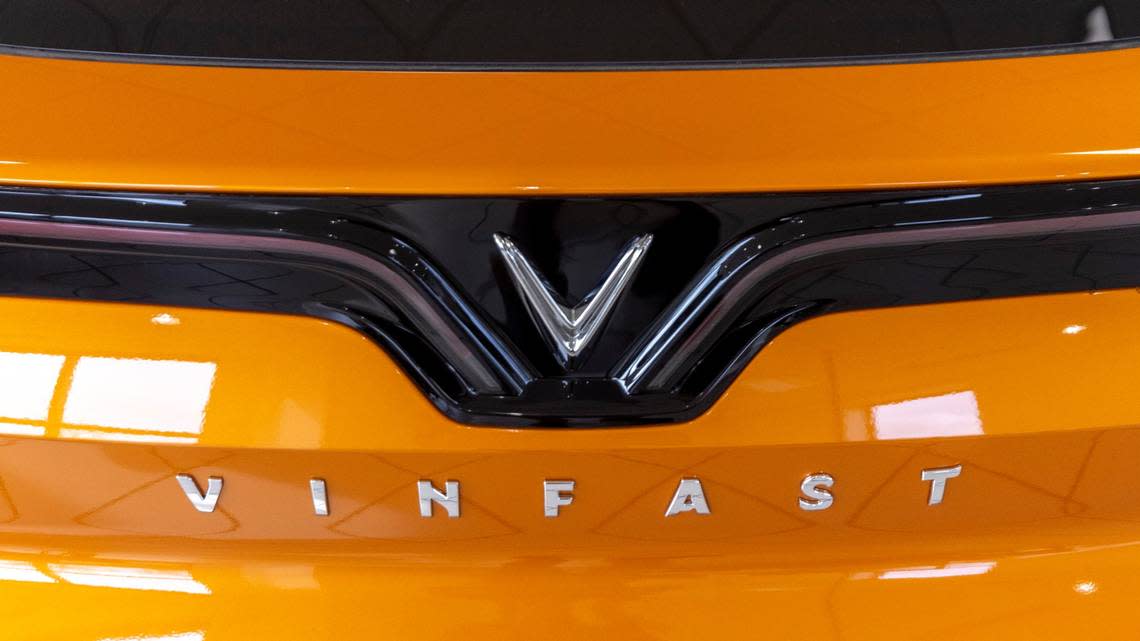
State officials, including the governor, express faith in VinFast. But even if one ignores the startup’s shallow track record, it’s a reality that most jobs projects backed by North Carolina incentives over the past 20 years didn’t reach their original hiring promises.
So how else are public dollars safeguarded in the VinFast deal? How much money has already been spent? How many jobs must VinFast actually create to get more? (Hint: much fewer than 7,500.) And what would it take for the state to buy the big Chatham site?
As VinFast construction continues, we explore the nuances of the company’s $1.25 billion package. Starting with:
Why did NC offer incentives in the first place?
For decades, North Carolina has wanted a major car manufacturer, only to watch candidates pick southern alternatives. In the early 1990s, the Tar Heel State was a finalist for the first Mercedes-Benz factory outside of Germany, which eventually went to Alabama. According to a 1993 Bloomberg article, Alabama offered the strongest incentive package at $250 million.
Over the following two decades, North Carolina whiffed on Volkswagen, Audi and Volvo. In 2018, the state lost Toyota-Mazda, again to Alabama, even though state officials had by then devised new incentive policies for the very purpose of landing major employers.
“North Carolina put $1.5 billion on the table, but it wasn’t enough to bring the state its first auto assembly plant,” The N&O wrote at the time.
When the deep-pocketed VinFast approached North Carolina in late 2021 about constructing a factory in Chatham, taxpayer-funded benefits were always part of the discussion.
What’s inside VinFast’s incentive deal?
$316.2 million – North Carolina Job Development Investment Grant
$400 million — Chatham County incentive package
$450 million — State appropriations from the North Carolina General Assembly
$38 million — North Carolina Community College System workforce training
$50 million — Golden LEAF Foundation (to enhance water and sewer infrastructure in Sanford)
When must VinFast begin hiring?
To receive payments under its North Carolina job development investment grant, known as a JDIG, VinFast must create at least:
1,997 jobs by the end of this year.
Then, its minimum hiring mark rises to:
3,624 jobs by the end of 2025
3,875 jobs for the remaining 10 years of the 12-year grant.
So VinFast can receive incentives if it hires fewer than 7,500 workers?
Yes. While “7,500 workers” has been the headline figure, VinFast can create roughly half those jobs and still receive JDIG payments for a dozen years.
These payments are realized essentially through payroll tax withholding rebates so hiring fewer workers means lower benefits.
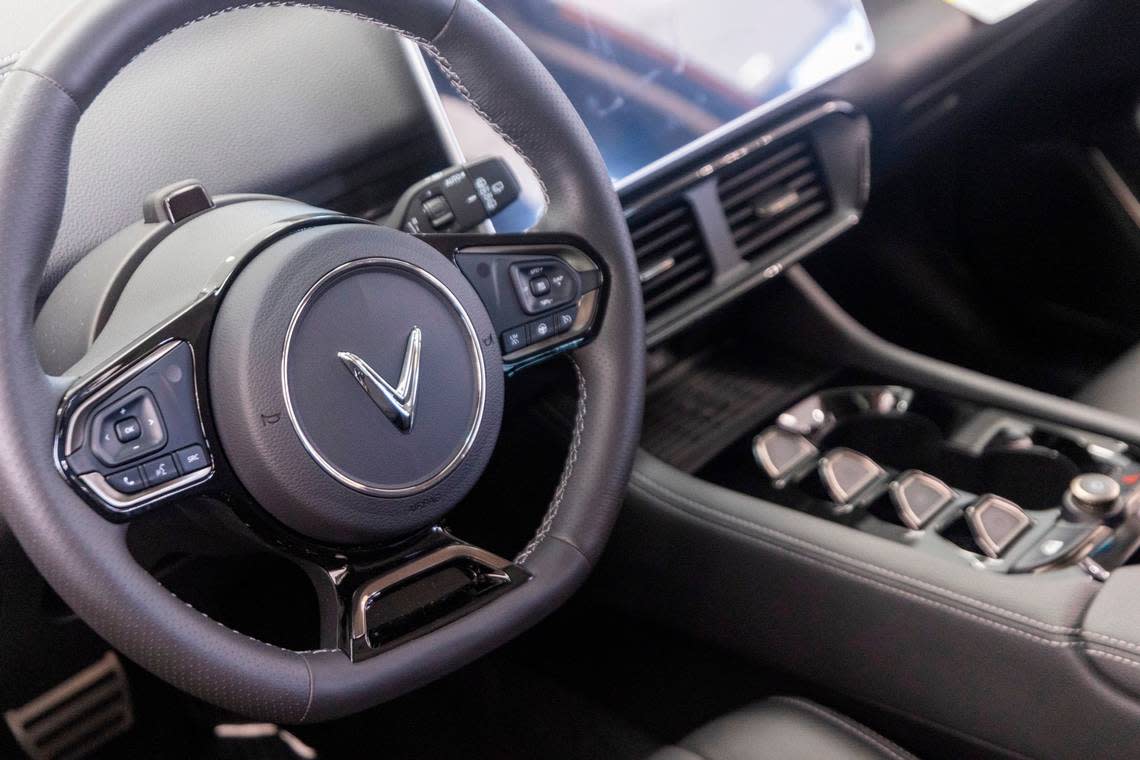
Can VinFast extend its job-creation deadlines?
Yes again, within a certain timetable.
The North Carolina Department of Commerce says VinFast can request a two-year extension if the company doesn’t meet its hiring and investment targets by 2027. Chatham County has its own incentives (more on that below), and it is allowing the carmaker to commence its grant any year before 2028.
Under its state agreement, VinFast is also required to invest at least $3.21 billion in the Moncure site by Dec. 31, 2026. But the Commerce Department says it will allow for partial JDIG payments in certain situations spelled out in its default policy with the company.
What’s in the General Assembly’s $400 million upfront package?
There’s the $125 million to reimburse VinFast for site preparation costs.
Then there’s $200 million for the North Carolina Department of Transportation to upgrade public roads and address wetlands around the Moncure site. The department received an additional $50 million that it will only spend once VinFast has created 3,875 jobs.
Finally, the General Assembly appropriated $75 million to expand water and sewer infrastructure in Sanford to serve the VinFast campus, which is about 18 miles away.
Has the state previously spent this kind of money before a company hires?
Until the past few years, it wasn’t common.
“You haven’t recently seen these types of appropriations from the General Assembly,” Beth Friedrich, then an economic development adviser for House Speaker Tim Moore, told The N&O in July 2022, shortly after the state appropriated $450 million for the VinFast project. “Normally you only see a JDIG.”
In addition to the VinFast project, the state legislature made “similar site preparation arrangements” for major incoming facilities from Wolfspeed, Toyota and Boom Supersonic, Rhoades said.
Given the scale of VinFast’s plans, North Carolina officials emphasize that upfront spending was necessary. And should the company not meet its goals, they point out the state has a mechanism to acquire the land for a potential new company to use.
Can the state claw back money it has spent?
It can. For one, North Carolina has clawback provisions for its $125 million in site expense reimbursements should VinFast default on its grant. If the EV maker ultimately creates fewer than 3,875 jobs, the state can claw back 100% of its reimbursement. If VinFast creates at least 3,875 jobs but fewer than 6,000 (and invests less than $2 billion), then the state can take back half of the $125 million.
Chatham also has a recapture mechanism for its two main incentive grants.
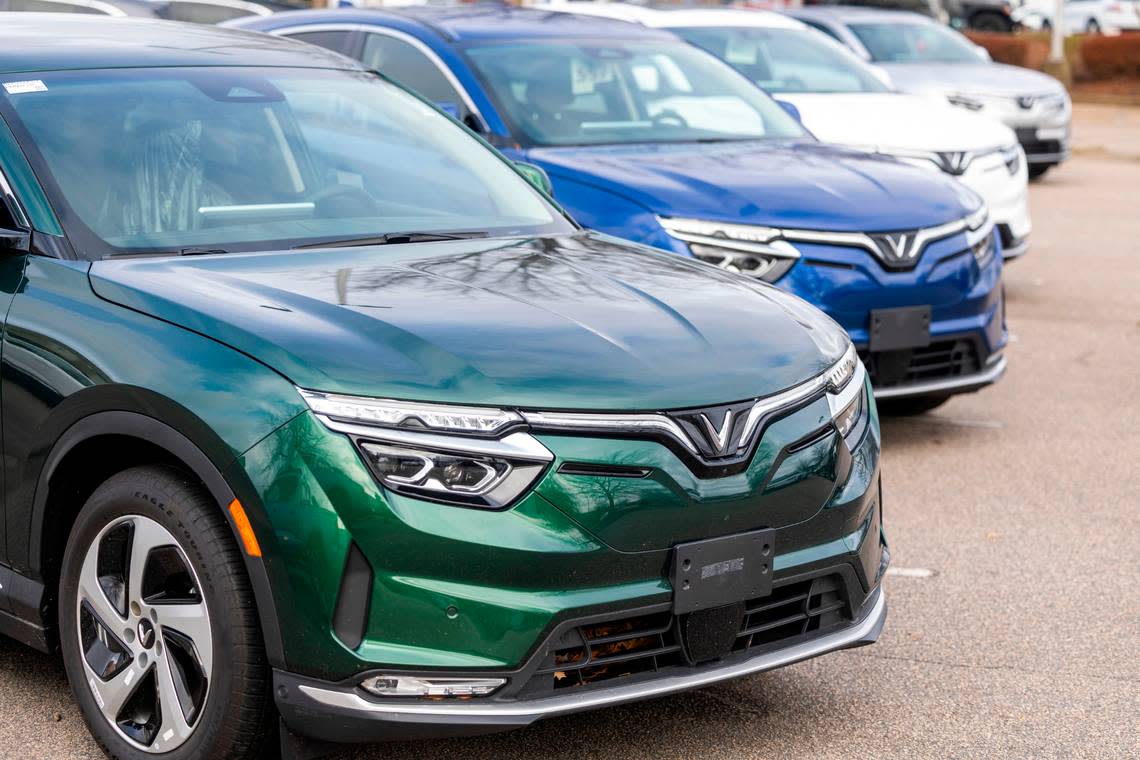
Be optimistic. What happens if VinFast hires 7,500 workers or more?
OK, back to the JDIG then.
If VinFast creates at least 6,000 jobs by the end of 2027, its normal JDIG will turn into what’s called a transformative grant.
This will extend its state agreement from 12 years to 42 years, and VinFast will be eligible for rebates on 90% of its annual payroll tax withholding instead of effectively around 56%.
Do public officials believe in the project?
Several say they’re assured, though two top state leaders didn’t comment.
“We are confident in VinFast’s commitment to this project, and we will continue to strengthen our supply chain while investing in training our highly skilled workforce to provide them with the workers they need.” — Jordan Monaghan, deputy communications director for the Office of Gov. Roy Cooper.
“All indications with VinFast right now are they’re going forward. They’ve recently, last week, had put in a new investment with one of our development partners in terms of doing some additional work on the site.” — Michael Smith of the Chatham County Economic Development Corporation.
“We didn’t just take anything that came. We wanted to make sure the people of Chatham County, and all our surrounding counties, had an opportunity for good jobs. Jobs that your children will have.” — Rep. Robert Reives, D-Chatham, at VinFast’s North Carolina groundbreaking event on July 28, 2023.
The N&O reached out to the offices of Senate President Pro Tempore Phil Berger and House Speaker Tim Moore to gauge their confidence in the project. Berger’s office did not respond, and Moore’s office declined to comment.
What happens to the megasite if VinFast defaults on its grant?
Glass half empty again. Typically, when a company purchases a site from a private owner (as VinFast did), the company can freely choose how to sell it. But because North Carolina poured public dollars into the site upfront, the state retained the right to buy all or parts of the megasite should VinFast not keep pace with a schedule detailed in the agreement.
The agreement splits the Chatham campus into three parcels: A, B, and C. Depending on VinFast’s performance by certain dates, the state may trigger its option “over the entire property or just certain parcels of the property,” Rhoades said. “This would allow the State to seek other projects that could also utilize the site if the project is successful, but not as large as originally projected by the company.”
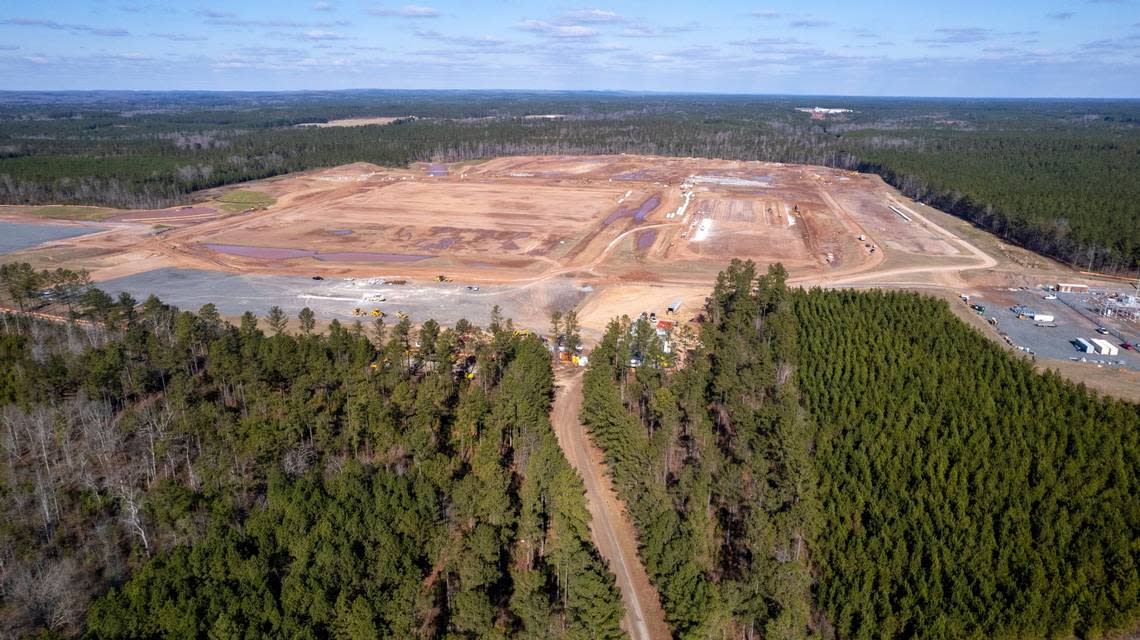
Besides starting operations by mid-2026, VinFast must also create at least 6,000 jobs by the end of 2032.
If the state ever exercises its option to buy parts or all of the site, the price tag will be calculated by how much VinFast paid per acre multiplied by the number of acres in the parcel being sold. The cost of the work VinFast put into the parcel will be added while the amount of money the state has already reimbursed the company will be subtracted. The sale can’t exceed $175 million.
You mention roadwork. What’s going on there?
NCDOT has so far spent a little over $18 million around the site, the department said.
A main objective of NCDOT is to create a direct access to the VinFast site from U.S. 1, a four-lane divided highway. The department has already repaved some local roads, and in December began to make offers to property owners whose land is in the path of a new highway interchange and a four-lane access road. Not all are happy.
NCDOT expects to buy 13 houses, one business and a church before it begins construction this year.
Michael Smith of the Chatham County Economic Development Corp. says the road improvements are worthwhile no matter what the future of the incoming project.
“If you’ve been on either of those interchanges, you would see that they are both in dire need of upgrading regardless of what happens at the VinFast site,” he said.
You also mentioned Chatham’s incentive deal…
Chatham included two main incentives for VinFast. As with the JDIG, these county incentives will only materialize once hiring and investments begin.
The first incentive, called the Business Investment Grant (BIG), gives rebates for a percentage of the local property taxes recipients pay. For the first four years of VinFast’s BIG, the company will receive back 90% of its property tax value, paid out the following year. This percentage falls to 80% between the fifth and eighth years and down to 50% after 16 years.
To comply with its BIG, VinFast has to meet a similar hiring timeline as the one set by the state. By the end of 2024, the company pledges to create at least 1,997 new jobs. The hiring minimum rises to 6,000 starting in 2027. But again, VinFast can choose to start this hiring timeline in any of the next four years.
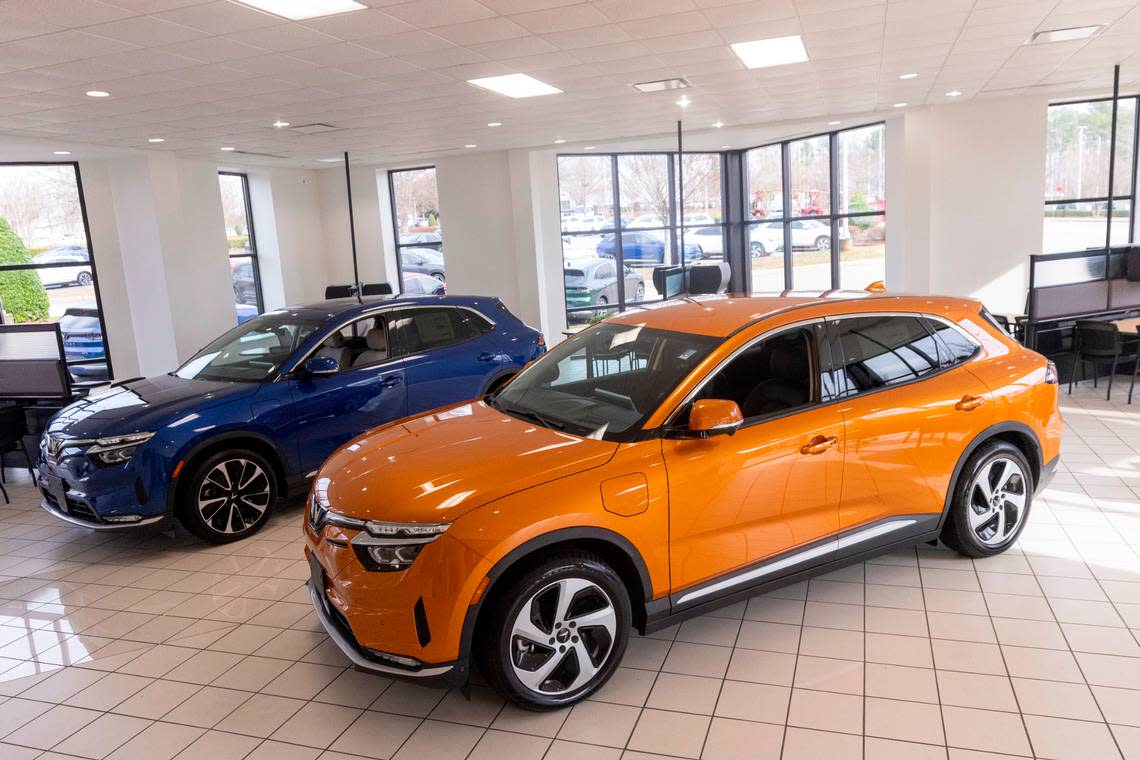
If the automaker hires fewer workers than the figures above, its BIG payments will be prorated according to the number of positions it created.
The second Chatham grant at play is the Land Acquisition Business Investment Grant (LABIG) which over a 20-year period repays VinFast for what the company spent purchasing the site from a private owner. “It’s a way of providing the site for free, but not doing it upfront,” Smith said. “So again, it’s a positive way to be competitive for the business. At the same time, it’s a positive way to protect our taxpayers.”
Chatham has a right to terminate the entire deal if VinFast doesn’t at least create 1,750 jobs and increase the tax value of the site by $700 million by Jan. 1, 2026.
Who is training VinFast workers?
Central Carolina Community College in Sanford is collaborating with VinFast to customize a workforce training curriculum to prepare thousands of workers for the nearby site. Project manager Erin Blakeley is leading the effort.
“All of this, to this scale, is brand new to the state,” she said.
Blakeley anticipates the training program will begin next January with each class lasting around five to six weeks. Of the $38 million allocated for this training by the General Assembly, only a sliver has been used so far to cover Blakeley’s salary and pay for upcoming trips to meet with VinFast in Vietnam.
Central Carolina won’t receive the bulk of the money until the training plans are set and specific funding is required.
How much money has Sanford already received?
The Lee County seat of Sanford has an agreement to provide water and sewer to the Triangle Innovation Point, the megasite on which VinFast is building. So far, the state has disbursed $15.6 million for the city to improve water and sewer, while the Golden LEAF Foundation has given Sanford $16.5 million for the same purpose.
Created with proceeds from a 1998 cigarette settlement, the nonprofit Golden LEAF strives to bolster growth opportunities in rural North Carolina communities.
To connect the VinFast site, Sanford needs to install approximately 25 miles of piping says Paul Weeks, the city’s utilities and engineering director. He estimated the city will have water to the site by Nov. 1.
NC Reality Check is an N&O series holding those in power accountable and shining a light on public issues that affect the Triangle or North Carolina. Have a suggestion for a future story? Email realitycheck@newsobserver.com
